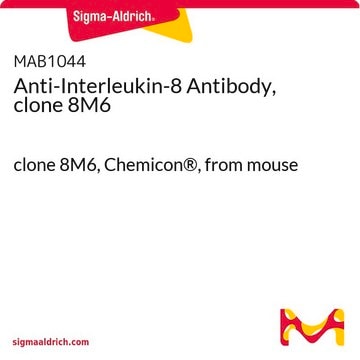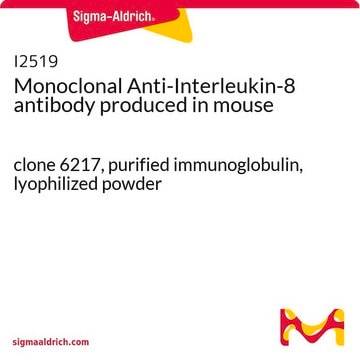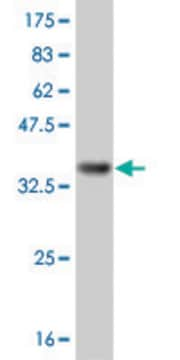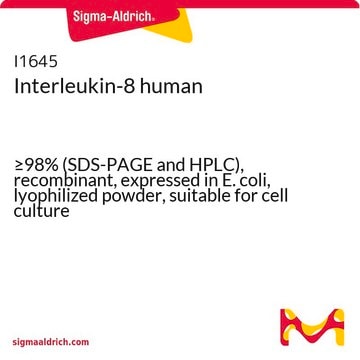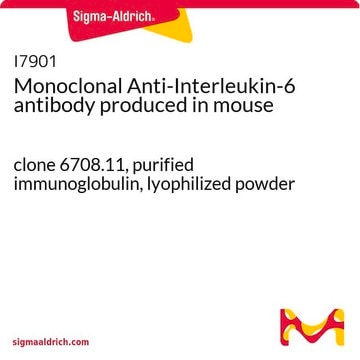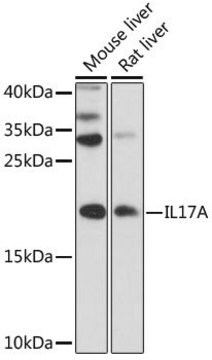AB1840
Anti-Interleukin-8 Antibody
serum, Chemicon®
Sinônimo(s):
IL-8
Faça loginpara ver os preços organizacionais e de contrato
About This Item
Código UNSPSC:
12352203
eCl@ss:
32160702
NACRES:
NA.41
Produtos recomendados
fonte biológica
rabbit
Nível de qualidade
forma do anticorpo
serum
tipo de produto de anticorpo
primary antibodies
clone
polyclonal
reatividade de espécies
sheep
fabricante/nome comercial
Chemicon®
técnica(s)
ELISA: suitable
nº de adesão NCBI
nº de adesão UniProt
Condições de expedição
dry ice
modificação pós-traducional do alvo
unmodified
Informações sobre genes
sheep ... Cxcl8(443418)
Especificidade
Reacts with ovine IL-8. No reactivity detected to recombinant ovine IL-1beta, IL-6, MCP or TNFalpha.
Imunogênio
Recombinant ovine IL-8
Aplicação
Anti-Interleukin-8 Antibody detects level of Interleukin-8 & has been published & validated for use in ELISA.
Detecting antibody in ELISA, using monoclonal anti-ovine IL-8 as capture antibody. Recommended dilution factor 1:500. See suggested protocol.
Optimal working dilutions must be determined by the end user.
Suggested ELISA Protocol For Ovine IL-8
1. Coat high capacity microtiter wells (e.g. Nunc maxisorp) with monoclonal anti-IL-8 antibody (Chemicon Catalog Number MAB1044) at a concentration of 5 μg/mL in 0.1 M carbonate buffer pH 9.6 overnight at 4ºC.
2. Wash wells 3 x with PBS + 0.05% Tween 20 (PBST).
3. Add samples to wells. Incubate at room temperature in a humidified box for 1 hour. Wash 3 x with PBST.
4. Dilute rabbit anti-IL-8 (Chemicon Catalog Number AB1840) 1:500 in PBST and add 100 μL to wells. Incubate at room temperature for 30 minutes. Wash 3 x with PBST.
5. Dilute anti-rabbit IgG-HRP to appropriate level in PBST and add 100 μL to wells. Incubate 30 minutes at room temperature. Wash 3 x with PBST.
6. Add 100 μL of TMB chromagen to each well. Incubate for 5-10 minutes and stop reaction with 50 μL of 2M sulfuric acid.
Notes:
The anti-rabbit IgG HRP must be adsorbed against mouse immunoglobulin, and should be checked for non-reactivity with coated plates.
Non-specific binding may be reduced by addition of protein such as skim milk powder to the diluents.
Assay sensitivity may be altered by adjusting incubation times and reagent concentrations.
Optimal working dilutions must be determined by the end user.
Suggested ELISA Protocol For Ovine IL-8
1. Coat high capacity microtiter wells (e.g. Nunc maxisorp) with monoclonal anti-IL-8 antibody (Chemicon Catalog Number MAB1044) at a concentration of 5 μg/mL in 0.1 M carbonate buffer pH 9.6 overnight at 4ºC.
2. Wash wells 3 x with PBS + 0.05% Tween 20 (PBST).
3. Add samples to wells. Incubate at room temperature in a humidified box for 1 hour. Wash 3 x with PBST.
4. Dilute rabbit anti-IL-8 (Chemicon Catalog Number AB1840) 1:500 in PBST and add 100 μL to wells. Incubate at room temperature for 30 minutes. Wash 3 x with PBST.
5. Dilute anti-rabbit IgG-HRP to appropriate level in PBST and add 100 μL to wells. Incubate 30 minutes at room temperature. Wash 3 x with PBST.
6. Add 100 μL of TMB chromagen to each well. Incubate for 5-10 minutes and stop reaction with 50 μL of 2M sulfuric acid.
Notes:
The anti-rabbit IgG HRP must be adsorbed against mouse immunoglobulin, and should be checked for non-reactivity with coated plates.
Non-specific binding may be reduced by addition of protein such as skim milk powder to the diluents.
Assay sensitivity may be altered by adjusting incubation times and reagent concentrations.
Research Category
Inflammation & Immunology
Inflammation & Immunology
Research Sub Category
Cytokines & Cytokine Receptors
Cytokines & Cytokine Receptors
forma física
Rabbit serum. Liquid containing 0.1% sodium azide.
Armazenamento e estabilidade
Maintain at -20°C in undiluted aliquots for up to 12 months. Avoid repeated freeze/thaw cycles.
Informações legais
CHEMICON is a registered trademark of Merck KGaA, Darmstadt, Germany
Exoneração de responsabilidade
Unless otherwise stated in our catalog or other company documentation accompanying the product(s), our products are intended for research use only and are not to be used for any other purpose, which includes but is not limited to, unauthorized commercial uses, in vitro diagnostic uses, ex vivo or in vivo therapeutic uses or any type of consumption or application to humans or animals.
Not finding the right product?
Try our Ferramenta de seleção de produtos.
Código de classe de armazenamento
10 - Combustible liquids
Classe de risco de água (WGK)
WGK 1
Certificados de análise (COA)
Busque Certificados de análise (COA) digitando o Número do Lote do produto. Os números de lote e remessa podem ser encontrados no rótulo de um produto após a palavra “Lot” ou “Batch”.
Já possui este produto?
Encontre a documentação dos produtos que você adquiriu recentemente na biblioteca de documentos.
Clare A Berry et al.
Reproductive sciences (Thousand Oaks, Calif.), 18(11), 1092-1102 (2011-04-16)
We tested the hypothesis that interleukin 1 (IL-1) mediates intra-amniotic lipopolysaccharide (LPS)-induced chorioamnionitis in preterm fetal sheep. Time-mated Merino ewes with singleton fetuses received IL-1α, LPS, or saline (control) by intra-amniotic injection 1 to 2 days before operative delivery at
Tate Gisslen et al.
Innate immunity, 20(2), 214-224 (2013-06-12)
Histologic chorioamnionitis, frequently associated with preterm births and adverse outcomes, results in prolonged exposure of preterm fetuses to infectious agents and pro-inflammatory mediators, such as LPS. Endotoxin tolerance-type effects were demonstrated in fetal sheep following repetitive systemic or intra-amniotic (i.a.)
Yong Zhu et al.
Biology of reproduction, 104(2), 317-324 (2020-12-11)
High unintended pregnancy rates are partially due to lack of effective nonhormonal contraceptives; development of safe, effective topical vaginal methods will address this need. Preclinical product safety and efficacy assessment requires in vivo testing in appropriate models. The sheep is
Charlotte van Gorp et al.
Nutrients, 11(5) (2019-05-01)
Chorioamnionitis, clinically most frequently associated with Ureaplasma, is linked to intestinal inflammation and subsequent gut injury. No treatment is available to prevent chorioamnionitis-driven adverse intestinal outcomes. Evidence is increasing that plant sterols possess immune-modulatory properties. Therefore, we investigated the potential
Modulation of lipopolysaccharide-induced chorioamnionitis in fetal sheep by maternal betamethasone.
Wolfe, KB; Snyder, CC; Gisslen, T; Kemp, MW; Newnham, JP; Kramer, BW; Jobe, AH; Kallapur, S
Reproductive Sciences null
Nossa equipe de cientistas tem experiência em todas as áreas de pesquisa, incluindo Life Sciences, ciência de materiais, síntese química, cromatografia, química analítica e muitas outras.
Entre em contato com a assistência técnica